托福考试阅读加试之达尔文进化论(原文)
托福TPO30阅读Passage2原文文本+题目+答案解析

为了帮助大家高效备考托福,为大家带来托福TPO30阅读Passage2原文文本+题目+答案解析,希望对大家备考有所帮助。
The Pace of Evolutionary Change A heated debate has enlivened recent studiesof evolution.Darwin's original thesis,and theviewpoint supported by evolutionary gradualists,isthat species change continuously but slowly and insmall increments.Such changes are all but invisible over the short time scale of modernobservations,and,it is argued,they are usually obscured by innumerable gaps in theimperfect fossil record.Gradualism,with its stress on the slow pace of change,is a comfortingposition,repeated over and over again in generations of textbooks.By the early twentiethcentury,the question about the rate of evolution had been answered in favor of gradualism tomost biologists'satisfaction. 最近的一个关于进化的研究引发了激烈的争论。
达尔文的原始论点和进化渐进主义者支持的观点是物种会持续地改变,但非常缓慢,增量也很小。
现代文阅读训练题目及答案科学家重新审视达尔文进化论
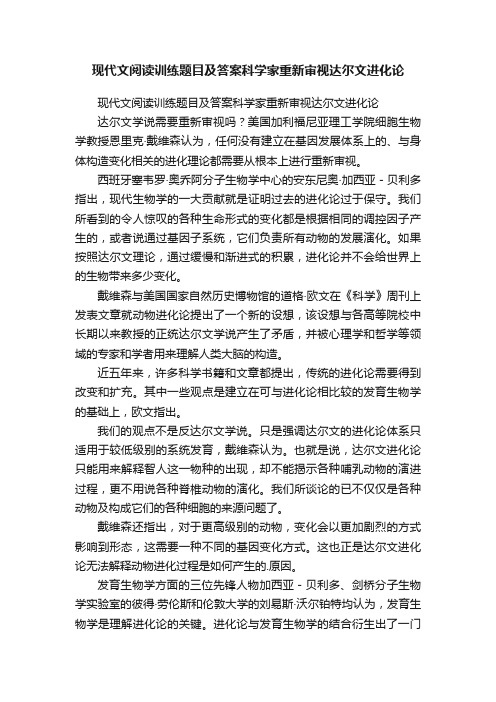
现代文阅读训练题目及答案科学家重新审视达尔文进化论现代文阅读训练题目及答案科学家重新审视达尔文进化论达尔文学说需要重新审视吗?美国加利福尼亚理工学院细胞生物学教授恩里克·戴维森认为,任何没有建立在基因发展体系上的、与身体构造变化相关的进化理论都需要从根本上进行重新审视。
西班牙塞韦罗·奥乔阿分子生物学中心的安东尼奥·加西亚-贝利多指出,现代生物学的一大贡献就是证明过去的进化论过于保守。
我们所看到的令人惊叹的各种生命形式的变化都是根据相同的调控因子产生的,或者说通过基因子系统,它们负责所有动物的发展演化。
如果按照达尔文理论,通过缓慢和渐进式的积累,进化论并不会给世界上的生物带来多少变化。
戴维森与美国国家自然历史博物馆的道格·欧文在《科学》周刊上发表文章就动物进化论提出了一个新的设想,该设想与各高等院校中长期以来教授的正统达尔文学说产生了矛盾,并被心理学和哲学等领域的专家和学者用来理解人类大脑的构造。
近五年来,许多科学书籍和文章都提出,传统的进化论需要得到改变和扩充。
其中一些观点是建立在可与进化论相比较的发育生物学的基础上,欧文指出。
我们的观点不是反达尔文学说。
只是强调达尔文的进化论体系只适用于较低级别的系统发育,戴维森认为。
也就是说,达尔文进化论只能用来解释智人这一物种的出现,却不能揭示各种哺乳动物的演进过程,更不用说各种脊椎动物的演化。
我们所谈论的已不仅仅是各种动物及构成它们的各种细胞的来源问题了。
戴维森还指出,对于更高级别的动物,变化会以更加剧烈的方式影响到形态,这需要一种不同的基因变化方式。
这也正是达尔文进化论无法解释动物进化过程是如何产生的.原因。
发育生物学方面的三位先锋人物加西亚-贝利多、剑桥分子生物学实验室的彼得·劳伦斯和伦敦大学的刘易斯·沃尔铂特均认为,发育生物学是理解进化论的关键。
进化论与发育生物学的结合衍生出了一门新题库:进化发育生物学。
达尔文的进化论
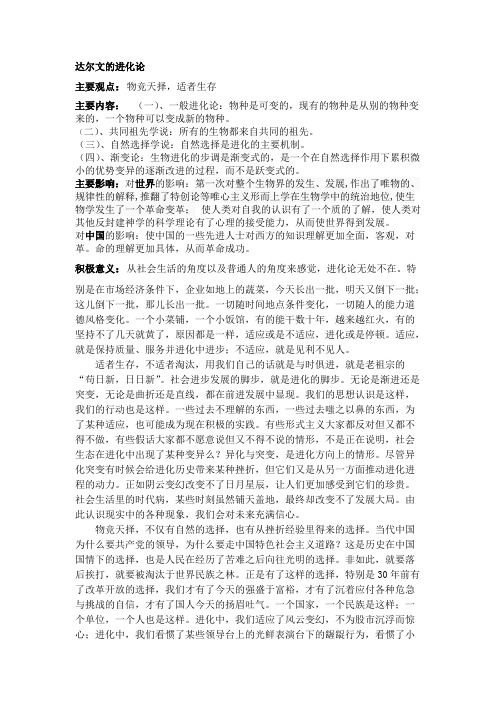
达尔文的进化论主要观点:物竞天择,适者生存主要内容: (一)、一般进化论:物种是可变的,现有的物种是从别的物种变来的,一个物种可以变成新的物种。
(二)、共同祖先学说:所有的生物都来自共同的祖先。
(三)、自然选择学说:自然选择是进化的主要机制。
(四)、渐变论:生物进化的步调是渐变式的,是一个在自然选择作用下累积微小的优势变异的逐渐改进的过程,而不是跃变式的。
主要影响:对世界的影响:第一次对整个生物界的发生、发展,作出了唯物的、规律性的解释,推翻了特创论等唯心主义形而上学在生物学中的统治地位,使生物学发生了一个革命变革;使人类对自我的认识有了一个质的了解,使人类对其他反封建神学的科学理论有了心理的接受能力,从而使世界得到发展。
对中国的影响:使中国的一些先进人士对西方的知识理解更加全面,客观,对革。
命的理解更加具体,从而革命成功。
积极意义:从社会生活的角度以及普通人的角度来感觉,进化论无处不在。
特别是在市场经济条件下,企业如地上的蔬菜,今天长出一批,明天又倒下一批;这儿倒下一批,那儿长出一批。
一切随时间地点条件变化,一切随人的能力道德风格变化。
一个小菜铺,一个小饭馆,有的能干数十年,越来越红火,有的坚持不了几天就黄了,原因都是一样,适应或是不适应,进化或是停顿。
适应,就是保持质量、服务并进化中进步;不适应,就是见利不见人。
适者生存,不适者淘汰,用我们自己的话就是与时俱进,就是老祖宗的“苟日新,日日新”。
社会进步发展的脚步,就是进化的脚步。
无论是渐进还是突变,无论是曲折还是直线,都在前进发展中显现。
我们的思想认识是这样,我们的行动也是这样。
一些过去不理解的东西,一些过去嗤之以鼻的东西,为了某种适应,也可能成为现在积极的实践。
有些形式主义大家都反对但又都不得不做,有些假话大家都不愿意说但又不得不说的情形,不是正在说明,社会生态在进化中出现了某种变异么?异化与突变,是进化方向上的情形。
尽管异化突变有时候会给进化历史带来某种挫折,但它们又是从另一方面推动进化进程的动力。
雅思阅读(达尔文)
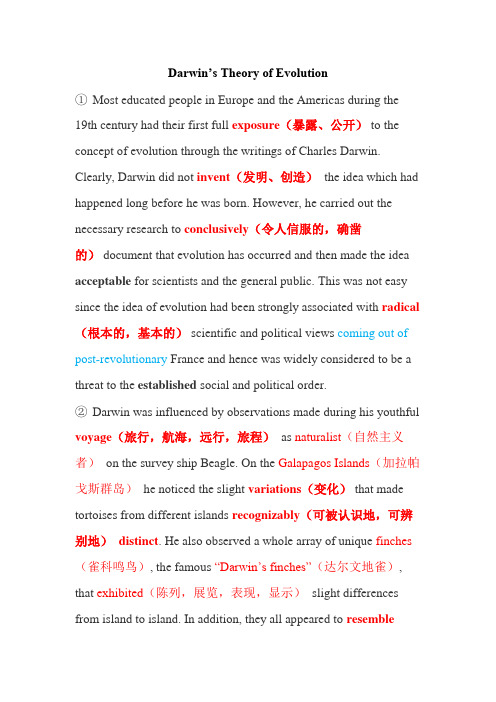
Darwin’s Theory of Evolution①Most educated people in Europe and the Americas during the19th century had their first full exposure(暴露、公开) to the concept of evolution through the writings of Charles Darwin. Clearly, Darwin did not invent(发明、创造)the idea which had happened long before he was born. However, he carried out the necessary research to conclusively(令人信服的,确凿的) document that evolution has occurred and then made the idea acceptable for scientists and the general public. This was not easy since the idea of evolution had been strongly associated with radical(根本的,基本的) scientific and political views coming out of post-revolutionary France and hence was widely considered to be a threat tothe established social and political order.②Darwin was influenced by observations made during his youthful voyage(旅行,航海,远行,旅程)as naturalist(自然主义者)on the survey ship Beagle. On the Galapagos Islands(加拉帕戈斯群岛)he noticed the slight variations(变化)that made tortoises from different islands recognizably(可被认识地,可辨别地)distinct. He also observed a whole array of unique finches(雀科鸣鸟), the famous “Darwin’s finches”(达尔文地雀), that exhibited(陈列,展览,表现,显示)slight differences from island to island. In addition, they all appeared to resemble(与…相像,类似于), butdiffer from, the common finch on the mainland(大陆,本土)of Ecuador(厄瓜多尔), 600 miles to the east. Patterns inthe distribution and similarity of organisms(有机物,有机体,生物)had an important influence of Darwin’s thinking.③Darwin’s theory of evolution entails(牵涉,需要,使必要)the following fundamental ideas. Firstly, species change over time and space. The representatives(代表)of species living today differ from those that lived in the recent past, and populations indifferent geographic regions today differ slightly in form or behavior. Secondly, all organisms share common ancestors(祖先)with other organisms. Over time(随着时间的过去), populations may diverge(分开、偏离) into different species which share a common ancestral(祖先的)population. This means far enough back in time(足够早的时间), any pair of organisms shares a common ancestor. For example, humans shared a common ancestor with chimpanzees about eight million years ago, with whales about 60 million years ago, and with kangaroos(袋鼠)over 100 million years ago. Thirdly, evolutionary change is gradual and slow in Darwin’s view. This claim(要求,声称)was supported by the long episodes(插曲,片段) of gradual change in organisms in the fossil record and the fact that no naturalist had observed the sudden appearance of a new species in Darwin’s tim e.④These first three ideas were already under discussion among earlier and contemporaneous(同时期的,同时代的) naturalists working on the “species problem” as Darwin began his research. Darwin’s most original contributions were the mechanism (机制)of natural selection and copious(丰富的,大量的)amounts of evidence for evolutionary change from many sources, as are demonstrated in his famous book The Origin of Species by Means of Natural Selection published in 1859. Darwin and his fellow naturalist Alfred Wallace independently came to the conclusion that geologically(从地质上来说)older species of life gave rise to geologically younger and different species through the process of natural selection.⑤Generally speaking, Darwin’s process of natural selection has four components(成分,组分). The first is variation. That is, organisms within populations exhibit(呈现,证明) individual(个人的,个别的,独特的)variation in appearance and behavior, involving body size, hair color, facial markings, voice properties, or number of offspring. The second is inheritance(遗传,继承), which means some traits(特性,特点)are heritable andare consistently passed on from parent to offspring, whereas other traits are strongly influenced by environmental conditions and show weak heritability. The third is high rate of population growth. Thissuggests that most populations have more offspring each year than local resources can support, leading to a struggle for resources and consequently(所以,因此)substantial(大量的,牢固的)mortality(死亡数)within each generation. The final component refers to(涉及,指的是,适用于)the differential(差别的) survival and reproduction among species. According to Darwin, individuals possessing traits well suited for the struggle for local resources are more likely to survive and to reproduce, passing those desirable(令人满意的,可取的)variations on to the next generation.⑥Some variations are helpful. For example, any variation that increases an antelope’s(羚羊)speed may help it elude(逃避,理解不了,抓不到)predators(食肉动物). Any variation that increases water retention(保留,滞留)in a desert plant will favor survival of that plant to reach maturity(成熟,完备). Those animals and plants that survive to maturity and are able to reproduce become the parents of the next generation, passing on the favorable variations. Darwin called the process by which such favorable(有利的)variations are passed from generation to generation natural selection.。
达尔文的进化论

达尔文的进化论主要观点:物竞天择,适者生存主要内容: (一)、一般进化论:物种是可变的,现有的物种是从别的物种变来的,一个物种可以变成新的物种。
(二)、共同祖先学说:所有的生物都来自共同的祖先。
(三)、自然选择学说:自然选择是进化的主要机制。
(四)、渐变论:生物进化的步调是渐变式的,是一个在自然选择作用下累积微小的优势变异的逐渐改进的过程,而不是跃变式的。
主要影响:对世界的影响:第一次对整个生物界的发生、发展,作出了唯物的、规律性的解释,推翻了特创论等唯心主义形而上学在生物学中的统治地位,使生物学发生了一个革命变革;使人类对自我的认识有了一个质的了解,使人类对其他反封建神学的科学理论有了心理的接受能力,从而使世界得到发展。
对中国的影响:使中国的一些先进人士对西方的知识理解更加全面,客观,对革。
命的理解更加具体,从而革命成功。
积极意义:从社会生活的角度以及普通人的角度来感觉,进化论无处不在。
特别是在市场经济条件下,企业如地上的蔬菜,今天长出一批,明天又倒下一批;这儿倒下一批,那儿长出一批。
一切随时间地点条件变化,一切随人的能力道德风格变化。
一个小菜铺,一个小饭馆,有的能干数十年,越来越红火,有的坚持不了几天就黄了,原因都是一样,适应或是不适应,进化或是停顿。
适应,就是保持质量、服务并进化中进步;不适应,就是见利不见人。
适者生存,不适者淘汰,用我们自己的话就是与时俱进,就是老祖宗的“苟日新,日日新”。
社会进步发展的脚步,就是进化的脚步。
无论是渐进还是突变,无论是曲折还是直线,都在前进发展中显现。
我们的思想认识是这样,我们的行动也是这样。
一些过去不理解的东西,一些过去嗤之以鼻的东西,为了某种适应,也可能成为现在积极的实践。
有些形式主义大家都反对但又都不得不做,有些假话大家都不愿意说但又不得不说的情形,不是正在说明,社会生态在进化中出现了某种变异么?异化与突变,是进化方向上的情形。
尽管异化突变有时候会给进化历史带来某种挫折,但它们又是从另一方面推动进化进程的动力。
The Evolution Wars 达尔文进化论之战

美英报刊文章阅读
(精选本)(第五版)
UNIT TWO
LESSON SIX
PART ONE
WARMING UP
Firstly, let's appreciate a video.
I:\Creationism Bites - In The Beginning . . ._标 清.kux
PART TWO
part four (Para11-14): The biologists answer that there are no holes in Darwin.
part five (Para15-17): One wonders what shall be taught in schools.
达尔文进化论主要内容

达尔文进化论主要内容示例文章篇一:嘿!同学们,你们知道达尔文的进化论吗?这可太神奇啦!达尔文的进化论就像是一把神奇的钥匙,打开了我们对生命奥秘的大门。
它说呀,物种不是一成不变的,而是在不断变化和发展的。
这就好像我们玩的搭积木游戏,一开始可能只是简单的几块积木,但是通过不断地组合、调整,最后能搭出各种各样的形状和结构。
物种不也是这样嘛!比如说长颈鹿。
你们想想,为啥长颈鹿的脖子那么长?按照达尔文的进化论,很久很久以前,长颈鹿的脖子可没这么长。
那时候,它们也得找吃的呀。
可是低处的树叶都被吃光啦,那咋办?只有那些脖子稍微长一点的长颈鹿,能够够到高处的树叶,才能吃饱活下去。
久而久之,长脖子的长颈鹿能留下更多后代,它们的后代也大多是长脖子,这不就慢慢进化出了我们现在看到的长脖子长颈鹿嘛!再看看鸟儿。
鸟儿的翅膀是咋来的?难道一开始就有那么完美的翅膀让它们飞翔?当然不是啦!也许最初只是一些小小的羽毛,慢慢地,经过无数代的变化,那些更适应环境、羽毛更有利于飞行的鸟儿才能生存下来,最终就有了能在天空自由翱翔的鸟儿。
这难道不神奇吗?达尔文还说,自然选择是进化的主要驱动力。
这就好比一场超级大考试,只有那些适应环境、表现出色的“学生”才能通过,才能生存和繁衍后代。
不适应的呢?那就只能被淘汰啦!比如说,在一个寒冷的地方,如果一种动物没有厚厚的皮毛来保暖,那它能扛得住寒冷的冬天吗?肯定不行啊!只有那些有厚皮毛的动物才能顺利过冬,把自己的基因传递下去。
还有啊,在一个充满竞争的环境里,动物们为了食物、领地、配偶,都在不断地努力和改变。
就像我们考试为了取得好成绩一样,都得拼命努力!同学们,你们说达尔文的进化论是不是超级有趣?它让我们看到了生命的奇妙和变化。
这难道不比那些魔法故事还精彩吗?它告诉我们,生命不是一成不变的,而是充满了无限的可能和惊喜!我们应该更加珍惜生命,去探索更多关于生命的奥秘!示例文章篇二:嘿!同学们,你们知道达尔文的进化论吗?这可真是超级有趣又神奇的东西!我来给你们讲讲哈。
2019年10月12日托福阅读考试真题及答案
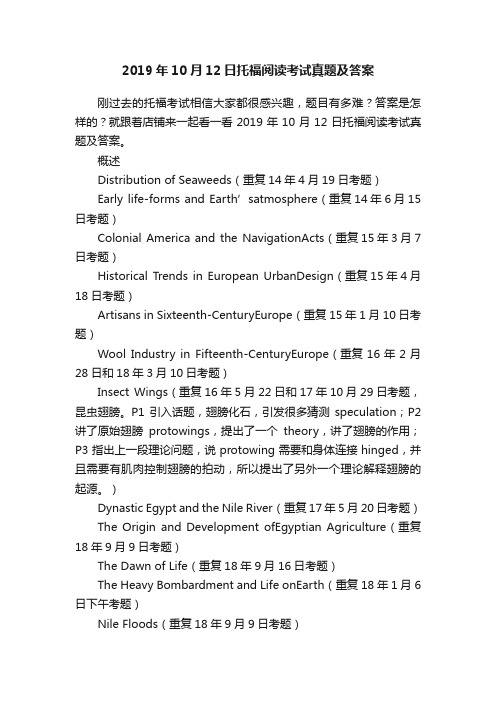
2019年10月12日托福阅读考试真题及答案刚过去的托福考试相信大家都很感兴趣,题目有多难?答案是怎样的?就跟着店铺来一起看一看2019年10月12日托福阅读考试真题及答案。
概述Distribution of Seaweeds(重复14年4月19日考题)Early life-forms and Earth’satmosphere(重复14年6月15日考题)Colonial America and the NavigationActs(重复15年3月7日考题)Historical Trends in European UrbanDesign(重复15年4月18日考题)Artisans in Sixteenth-CenturyEurope(重复15年1月10日考题)Wool Industry in Fifteenth-CenturyEurope(重复16年2月28日和18年3月10日考题)Insect Wings(重复16年5月22日和17年10月29日考题,昆虫翅膀。
P1引入话题,翅膀化石,引发很多猜测speculation;P2讲了原始翅膀protowings,提出了一个theory,讲了翅膀的作用;P3指出上一段理论问题,说protowing需要和身体连接hinged,并且需要有肌肉控制翅膀的拍动,所以提出了另外一个理论解释翅膀的起源。
)Dynastic Egypt and the Nile River(重复17年5月20日考题)The Origin and Development ofEgyptian Agriculture(重复18年9月9日考题)The Dawn of Life(重复18年9月16日考题)The Heavy Bombardment and Life onEarth(重复18年1月6日下午考题)Nile Floods(重复18年9月9日考题)Text in Dutch Painting(重复19年1月12日考题;艺术绘画中文字的演变)The Dawn ofLife(重复18年9月16日考题)最早的有生命痕迹的证据在澳大利亚southwesternGreenland的岩石上被发现,距今有35亿年。
托福阅读TPO30(试题+答案+...

托福阅读TPO30(试题+答案+译文)第2篇:ThePaceofEvolutionaryChange为了帮助大家备考托福。
提高阅读成绩,打有准备的仗,下面小编给大家带来托福阅读TPO30(试题+答案+译文)第2篇:The Pace of Evolutionary Change,希望大家喜欢。
托福阅读原文【1】A heated debate has enlivened recent studies of evolution. Darwin's original thesis, and the viewpoint supported by evolutionary gradualists, is that species change continuously but slowly and in small increments. Such changes are all but invisible over the short time scale of modern observations, and, it is argued, they are usually obscured by innumerable gaps in the imperfect fossil record. Gradualism, with its stress on the slow pace of change, is a comforting position, repeated over and over again in generations of textbooks. By the early twentieth century, the question about the rate of evolution had been answered in favor of gradualism to most biologists' satisfaction.【2】Sometimes a closed question must be reopened as new evidence or new arguments based on old evidence come to light. In 1972 paleontologist Stephen Jay Gould and Niles Eldredge challenged conventional wisdom with an opposing viewpoint, the punctuated equilibrium hypothesis, which posits that species give rise to new species in relatively sudden bursts, without a lengthy transition period. These episodes of rapid evolution are separated by relatively long static spans during which a species may hardly change at all.【3】The punctuated equilibrium hypothesis attempts to explain a curious feature of the fossil record—one that has been familiar to paleontologist for more than a century but has usuallybeen ignored. Many species appear to remain unchanged in the fossil record for millions of years—a situation that seems to be at odds with Darwin's model of continuous change. Intermediated fossil forms, predicted by gradualism, are typically lacking. In most localities a given species of clam or coral persists essentially unchanged throughout a thick formation of rock, only to be replaced suddenly by a new and different species.【4】The evolution of North American horse, which was once presented as a classic textbook example of gradual evolution, is now providing equally compelling evidence for punctuated equilibrium. A convincing 50-million-year sequence of modern horse ancestors—each slightly larger, with more complex teeth, a longer face, and a more prominent central toe—seemed to provide strong support for Darwin's contention that species evolve gradually. But close examination of those fossil deposits now reveals a somewhat different story. Horses evolved in discrete steps, each of which persisted almost unchanged for millions of years and was eventually replaced by a distinctive newer model. The four-toed Eohippus preceded the three-toed Miohippus, for example, but North American fossil evidence suggests a jerky, uneven transition between the two. If evolution had been a continuous, gradual process, one might expect that almost every fossil specimen would be slightly different from every year.【5】If it seems difficult to conceive how major changes could occur rapidly, consider this: an alteration of a single gene in files is enough to turn a normal fly with a single pair of wings into one that has two pairs of wings.【6】The question about the rate of evolution must now be turned around: does evolution ever proceed gradually, or does italways occur in short bursts? Detailed field studies of thick rock formations containing fossils provide the best potential tests of the competing theories.【7】Occasionally, a sequence of fossil-rich layers of rock permits a comprehensive look at one type of organism over a long period of time. For example, Peter Sheldon's studies of trilobites, a now extinct marine animal with a segmented body, offer a detailed glimpse into three million years of evolution in one marine environment. In that study, each of eight different trilobite species was observed to undergo a gradual change in the number of segments—typically an increase of one or two segments over the whole time interval. No significant discontinuous were observed, leading Sheldon to conclude that environmental conditions were quite stable during the period he examined.【8】Similar exhaustive studies are required for many different kinds of organisms from many different periods. Most researchers expect to find that both modes of transition from one species to another are at work in evolution. Slow, continuous change may be the norm during periods of environmental stability, while rapid evolution of new species occurs during periods of environment stress. But a lot more studies like Sheldon's are needed before we can say for sure.托福阅读试题1.The word "innumerable" in the passage is closest in the meaning toA.countless.B.occasional.rge.D.repeated.2.According to paragraph 1, all of the following are true EXCEPTA.Darwin saw evolutionary change as happening slowly and gradually.B.Gaps in the fossil record were used to explain why it is difficult to see continuous small changes in the evolution of species.C.Darwin's evolutionary thesis was rejected because small changes could not be observed in the evolutionary record.D.By the early twentieth century, most biologists believed that gradualism explained evolutionary change.3.Which of the sentences below best expresses the essential information in the highlighted sentence in the passage paragraph 2 ? Incorrect choices change the meaning in important ways or leave out essential information.A.The punctuated equilibrium hypothesis challenged gradualism, which holds that species evolve in relatively sudden bursts of brief duration.B.The punctuated equilibrium hypothesis developed by Stephen Jay Gould and Niles Eldredge was challenged in 1972.C.In 1972 Stephen Jay Gould and Niles Eldredge challenged gradualism by positing that change from one species to another cannot occur without a lengthy transition period.D.The punctuate equilibrium hypothesis, in opposition to gradualism, holds that transitions from one species to another occur in comparatively sudden burst.4.According to paragraph 1 and paragraph 2, the punctuated equilibrium hypothesis and the gradualism hypothesis differed aboutA.Whether the fossil record is complete.B.Whether all species undergo change.C.Whether evolution proceeds an a constant rate.D.How many new species occur over long periods of time.5.According to paragraph 3, the lack of intermediate fossils in the fossil record of some speciesA.has been extensively studied by paleontologist for over a century.B.contradicts the idea that most species have remained unchanged for millions of years.C.challenges the view that evolutionary change is gradual.D.is most common in the fossil records of clam and coral species.6.The word "compelling" in the passage paragraph 4 is closest in the meaning toA.surprising.B.persuasive.C.controversial.D.detailed.7.Paragraph 4 mentions that North American horses have changed in all the following ways EXCEPT inA.the number of toes they have.B.the length of their face.C.their overall size.D.the number of years they live.8.The word "alteration" in the passage paragraph 5 is closest in meaning toA.imperfection.B.replacement.C.change.D.duplication.9.According to paragraph 7, Peter Sheldon's studies demonstrated which ofthe following about trilobites?A.They underwent gradual change over a long time period.B.They experienced a number of discontinuous transitions during their history.C.They remained unchanged during a long period of environmental stability.D.They evolved in ways that cannot be counted for by either of the two competing theories.10.The word "occasionally" in the passage paragraph 7 is closest in meaning toA.undoubtedly.B.basically.C.once in a while.D.to some extent.11.The main purpose of paragraph 7 is toA.Describe one test of the competing theories.B.Provide an example of punctuated equilibrium.C.Describe how segmented animals evidence both competing theories.D.Explain why trilobites became extinct.12. Look at the four squares [■] that indicate where the following sentence can be added to the passage.Where could the sentence best fit? They believe that environmental conditions may play a crucial role in determining which of the two modes will be in operation over a given period.■【A】Similar exhaustive studies are required for many different kinds of o rganisms from many different periods. ■【B】Most researchers expect to find that both modes of transition from one species to another are at work in evolution.■【C】Slow,continuous change may be the norm during periods of environmental stability, while rapid evolution of new species occurs during periods of environment stress. ■【D】But a lot more studies like Sheldon's are needed before we can say for sure.13.Directions: selected from the seven phrases below the phrases that correctly characterize punctuated equilibrium and the phrases that correctly characterize gradualism. Two of the phrases will not be used. This question is worth 3 points.A.States that new species emerge from existing species during relatively brief period of time.B.Was first formulated by Charles Darwin.C.Explain why North American horses have become smaller over time.D.States that new species evolve slowly and continuously from existing species.E.Explain the lack of intermediate fossil forms in the fossil record of many species.petition is usually strongest when the density of the competing populations is the same.G.States that a species will not change unless its environment changes.1 )GradualismA B C D E F G2 )punctuated equilibriumA B C D E F G托福阅读答案1.innumerable是不可计数的,A是无数的,B是偶然的,C是大的,D是重复的。
达尔文猿猴进化论英语阅读

达尔文猿猴进化论英语阅读Charles Darwin's whole life was changed by one lucky chance. In 1831, before he went on the voyage1 of the Beagle2, he was a very ordinary young man of twenty-two.No one in England—certainly not Darwin himself —had any idea of the future he had before him.His sister Caroline gave him his first lessons. He was both lazy and naughty, and everyone was glad that he went away to school after his mother's death when he was eight.Charles soon became a keen collector.He collected anything that caught his interest: insects3, seashells, coins and interesting stones. He said later that his collection prepared him for his work as a naturalist4.He was not a very clever boy, but Charles was good at doing the things that interested him. He also took pleasure in carrying out experiments.But he could not learn Latin and Greek which in those days were an important part of education. He was a disappointment to his father, who was sure that he would bring nothing but shame to himself and his family.In 1825, when Charles was sixteen, his fathersent him to Edinburgh to study medicine, saying :“As you like natural history5 so much, perhaps we can make a doctor of you.”But Charles found the lectures boring, and the dissections6 frightening.But at Edinburgh he was able to go to natural history lectures. In 1826 he read a paper on sea-worms to the Natural History Society. This paper was his first known work on this subject.Then his father decided to send Charles to Cambridge University to study to become a priest.With hard work, he did quite well. And, in the countryside around Cambridge, he was able to shoot, fish and collect insects.He seemed likely to become a country priest like hundreds of others, sharing his time between his work and his interest in natural history and country life. He had a deep faith in God and a lasting interest in religion7.At this time he did not doubt that every word of the Bible was true.Then a letter from Captain Robert FitzRoy changed his life. FitzRoy was planning to make a voyage around the world on a ship called the Beagle. He wanted a naturalist to join the ship, and Darwinwas recommended8.That voyage was the start of Charles Darwin's great life work.In those days a great many people believed that every word written in the Bible was true. Darwin hoped that the plants and animals that they found in the course of their voyage would prove the truth of the Bible story of the great Flood9.He began to observe everything. When they got to Rio de Janeiro in South America, Charles was overcome with joy to see so many different creatures, so much life and colour.His notebooks were full of detailed observations.Then they reached dry land at Punta Alta. There Darwin discovered his first fossils10. Why, he wondered, were there horse bones at Punta Alta, when there had been no horses in the New World until Cortez brought his from Spain11?They came to Tierra del Fuego at the tip of South America. It was a strange place, with terrible storms. Its people grew no food, and they slept on the wet ground. Darwin observed their looks and habits.“How can people be so different, if all are descended12 from Adam and Eve in the Garden of Eden?” Charles wondered.A tripinto the mountains showed Darwin seashells at a height of 12,000 feet. Lower down were fossil trees.“So those trees once stood by the sea,” thought Darwin. “The sea came up and covered them. Then the sea-bed rose up...”.To a man who had been taught that every word in the Bible was true, this was very puzzling.In Chile, where Darwin saw earthquakes and volcanoes, he began to see what must have happened. The centre of the earth, he decided, was very hot. The surface of the earth was thinner in some places. It was in these places that earthquakes and volcanoes developed.As the Beagle sailed around the world, Darwin began to wonder how life had developed on earth. He saw volcanic islands in the sea, and wondered how living things had got there.But people who believed every word of the Bible thought that God had made all creatures and Man.But, if that was true, why did some of the fossils look like “mistakes” which had failed to change and, for that reason, died out?On went Beagle, to Tahiti13, New Zealand and Australia. There, Darwin saw coral and coral islands for the first time. How had theseislands come about14? Soon, he had the answer. Coral was made up of the bodies of millions of tiny creatures, piled up over millions of years —a million years for each island.Darwin wrote it all down in his notebooks.After five years he was home. He was never again the healthy young man who climbed mountains and carried heavy bags of fossils for miles.He set to work, getting his collection in order. And, in 1839, he married his cousin15, Emma Wedgwood. It was a happy marriage with ten children.He could be found working in his study, with a child beside him.His first great work The Zoology of the Beagle was well received, but he was slow to make public his ideas on the origins16 of life. He was certainly very worried about disagreeing with the accepted views of the Church.Happily, the naturalists at Cambridge persuaded Darwin that he must make his ideas public. So Darwin and Wallace, another naturalist who had the same opinions as Darwin, produced a paper together.A year later Darwin's great book, On the Origin of Species by Means of Natural Selection appeared. It attracted a storm.People thought that Darwin was saying they were descended from monkeys.What a shameful idea! Although most scientists agreed that Darwin was right and that the story of Adam and Eve was merely a story, the Church was still so strong that Darwin never received any honours for his work.Many years later, he published his other great work, The Descent of Man. He gave a lecture at the Royal Institution17, when the whole audience stood up and clapped18.His health grew worse, but still he worked. “When I have to give up observation, I shall die,” he said. He was still working on 17, April, 1882. He was dead two days later.。
托福阅读达尔文进化论原文及答案
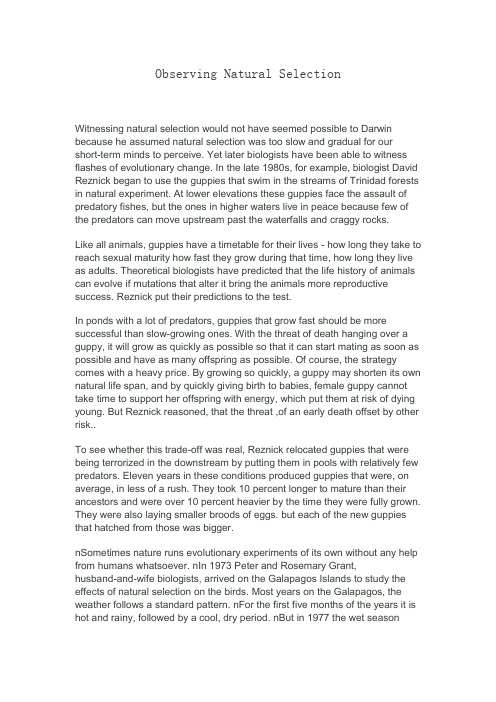
Observing Natural SelectionWitnessing natural selection would not have seemed possible to Darwin because he assumed natural selection was too slow and gradual for ourshort-term minds to perceive. Yet later biologists have been able to witness flashes of evolutionary change. In the late 1980s, for example, biologist David Reznick began to use the guppies that swim in the streams of Trinidad forests in natural experiment. At lower elevations these guppies face the assault of predatory fishes, but the ones in higher waters live in peace because few of the predators can move upstream past the waterfalls and craggy rocks.Like all animals, guppies have a timetable for their lives - how long they take to reach sexual maturity how fast they grow during that time, how long they live as adults. Theoretical biologists have predicted that the life history of animals can evolve if mutations that alter it bring the animals more reproductive success. Reznick put their predictions to the test.In ponds with a lot of predators, guppies that grow fast should be more successful than slow-growing ones. With the threat of death hanging over a guppy, it will grow as quickly as possible so that it can start mating as soon as possible and have as many offspring as possible. Of course, the strategy comes with a heavy price. By growing so quickly, a guppy may shorten its own natural life span, and by quickly giving birth to babies, female guppy cannot take time to support her offspring with energy, which put them at risk of dying young. But Reznick reasoned, that the threat ,of an early death offset by other risk..To see whether this trade-off was real, Reznick relocated guppies that were being terrorized in the downstream by putting them in pools with relatively few predators. Eleven years in these conditions produced guppies that were, on average, in less of a rush. They took 10 percent longer to mature than their ancestors and were over 10 percent heavier by the time they were fully grown. They were also laying smaller broods of eggs. but each of the new guppies that hatched from those was bigger.nSometimes nature runs evolutionary experiments of its own without any help from humans whatsoever. nIn 1973 Peter and Rosemary Grant,husband-and-wife biologists, arrived on the Galapagos Islands to study the effects of natural selection on the birds. Most years on the Galapagos, the weather follows a standard pattern. nFor the first five months of the years it is hot and rainy, followed by a cool, dry period. nBut in 1977 the wet seasonnever came. A periodic disturbance of the Pacific ocean called La Nina altered weather patterns over the Galapagos, causing a disastrous drought.On Daphne Island, where the Grants worked, the drought was lethal. Out of the 1,200 medium ground finches Geospiza fortis that lived on the Island, more that 1,000 died. But the Grants discovered that the decimation was not random.G fortis lives mainly on seeds, which it cracks with its strong beak. Small G. fontis can break only small seeds, but larger birds have beaks that are strong enough to break big ones. The drought had lingered for a few months, the small finches ran out of small seeds and began dying off. But the big finches managed to survive, because they could eat seeds that the smaller ones couldn't get to. (In particular, they depended on a plant called caltrop, which grows spiked shells to protect it seeds).The survivors on the 1977 drought mated in 1978, and the Grants could see evolution's mark on their offspring. A new generation of G. fortis was born, and the Grants' student Peter Boag discovered that, on average, their beaks were 4 percent larger than those of the previous generation. The big-beaked finches, which had fared better during the drought had put their trait to their offspring, altered the profile of the population.In the years since the drought the finches changed. In 1983, for example, there was a season of heavy rain, abundant seeds favored finches with smaller beaks and Grants found that by 1985 their average size had dropper 5 percent. The finches can change quickly, but it seems that are swinging back and forth like a pendulum.关于natural selection:Darwin 的natural selection本来需要long time evolution 来验证,本文则是用了两个relatively short evolution's examples 来support natural selection。
托福阅读tpo55R-2原文+译文+题目+答案+背景知识
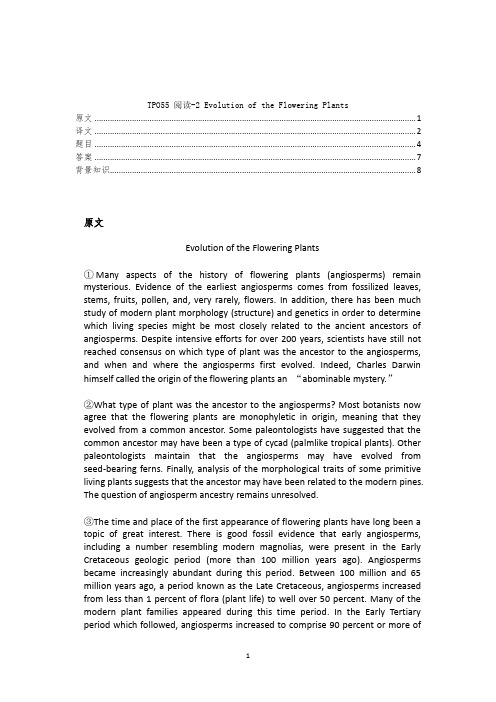
TPO55 阅读-2 Evolution of the Flowering Plants原文 (1)译文 (2)题目 (4)答案 (7)背景知识 (8)原文Evolution of the Flowering Plants①Many aspects of the history of flowering plants (angiosperms) remain mysterious. Evidence of the earliest angiosperms comes from fossilized leaves, stems, fruits, pollen, and, very rarely, flowers. In addition, there has been much study of modern plant morphology (structure) and genetics in order to determine which living species might be most closely related to the ancient ancestors of angiosperms. Despite intensive efforts for over 200 years, scientists have still not reached consensus on which type of plant was the ancestor to the angiosperms, and when and where the angiosperms first evolved. Indeed, Charles Darwin himself called the origin of the flowering plants an “abominable mystery.”②What type of plant was the ancestor to the angiosperms? Most botanists now agree that the flowering plants are monophyletic in origin, meaning that they evolved from a common ancestor. Some paleontologists have suggested that the common ancestor may have been a type of cycad (palmlike tropical plants). Other paleontologists maintain that the angiosperms may have evolved from seed-bearing ferns. Finally, analysis of the morphological traits of some primitive living plants suggests that the ancestor may have been related to the modern pines. The question of angiosperm ancestry remains unresolved.③The time and place of the first appearance of flowering plants have long been a topic of great interest. There is good fossil evidence that early angiosperms, including a number resembling modern magnolias, were present in the Early Cretaceous geologic period (more than 100 million years ago). Angiosperms became increasingly abundant during this period. Between 100 million and 65 million years ago, a period known as the Late Cretaceous, angiosperms increased from less than 1 percent of flora (plant life) to well over 50 percent. Many of the modern plant families appeared during this time period. In the Early Tertiary period which followed, angiosperms increased to comprise 90 percent or more ofEarth’s total flora. Where did these successful plants first originate and spread from?④Analysis of the fossil leaf structure and geographic distribution of the earliest Cretaceous angiosperms has led many biogeographers to conclude that they evolved in the tropics and then migrated poleward. It is known that angiosperms did not become dominant in the high latitudes until the Late Cretaceous. Paleontologists have recovered fossil angiosperm leaves, stems, and pollen from Early Cretaceous deposits in eastern South America and western Africa. These two continents were joined together as part of Gondwanaland, one of two supercontinents that existed at that time. The locations of these early angiosperm finds would have been close to the equator during the Early Cretaceous and are conformable with a model by which angiosperms spread from the tropics poleward.⑤Not all botanists agree with an African-South American center for the evolution and dispersal of the angiosperms, pointing out that many of the most primitive forms of flowering plants are found in the South Pacific, including portions of Fiji, New Caledonia, New Guinea, eastern Australia, and the Malay Archipelago. Recent genetic research has identified the rare tropical shrub Amborella as being the living plant most closely related to the ancient ancestor of all the angiosperms. This small shrub, which has tiny yellow-white flowers and red fruit, is found only on New Caledonia, a group of islands in the South Pacific. Many botanists conclude that the best explanation for the large numbers of primitive living angiosperms in the South Pacific region is that this is where the flowering plants first evolved and these modern species are relics of this early evolution. Comparisons of the DNA of Amborella and many hundreds of species of flowering plants suggest that the first angiosperm arose and the development of separate species occurred about 135 million years ago.⑥Recently discovered fossils complicate our understanding of the origin of the angiosperms even further. Paleontologists from China have found beautifully preserved fossils of an angiosperm plant, including flowers and seeds, in Jurassic period deposits from China. The site, which is about 130 million years old, is near modern Beijing. The new fossil plant found at the site is one of the oldest known angiosperms. The age of the fossils and the very primitive features of the flowers have led the discoverers to suggest that the earliest flowering plants may have evolved in northern Asia.译文开花植物进化史①开花植物(被子植物)历史的很多方面仍然是神秘的。
达尔文生物进化论(原创)
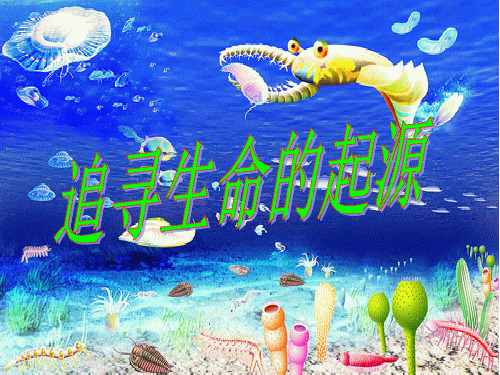
牛津主教 威尔伯福斯
否定人 是由猿 进化而 来的。
达尔文的斗犬 赫胥黎
Vs
捍卫进 化论
打倒进化论!
拯救心灵! 打倒达尔文!
粉碎达尔文! 你是英国最危 险的人!
科学
以事实为依据 世界是上帝创 造的,世界是 静止的
世界是物质自 然发展形成的, 事物是运动发 展的
以想象和臆测 为依据
宗教
1、《物种起源》的出版,在欧洲乃至整个世界都引起轰 动。它沉重地打击了神权统治的根基,从反动教会到封建 它沉重地打击了神权统治的根基 御用文人都狂怒了。他们群起攻之,诬蔑达尔文的学说 “亵渎圣灵”,触犯“君权神授天理,”有失人类尊严 。
遗憾之:物种进化的考古证据还明显不足
困惑?
美国的盖洛普公司在1982、1993、 1997、1999年进行了4次民意调查,其 结果均显示,坚信“上帝造人”的美国 成年人的比例,不低于受访者的44%。 只有12%的人相信人类由其他动物进化 而来。
科学没有宗教就像瘸子,宗教没有科学就像瞎子。 科学与宗教的斗争还将继续, ——爱因斯坦 科学的探索永无止境。
8
高
低
最原始的 简单生物
物种由低级向高级逐渐进化
长颈鹿产生的后代超过环境承受能力(过度繁殖);
请同学们根据所学的进化论内容,写一篇简 它们都要吃树叶而树叶不够吃(生存斗争); 短的关于长颈鹿进化的小论文。
它们有颈长和颈短的差异(遗传变异); 颈长的能吃到树叶生存下来,颈短的却因吃不到树叶而最 终饿死了(适者生存)。
课堂练习
2、达尔文的代表作是 • A.《自然系统》 • B. 《人类在自然界中的位置》 • C.《物种起源》 • D. 《天演论》
课堂练习
3、发表文章论证了“人的构造和其他动物 一样,尤其和猿更接近”的生物学家是 ( ) • A 达尔文 • B 赫胥黎 • C 威尔伯福斯 • D 巴斯德
达尔文进化论说明文5篇

达尔文进化论说明文5篇生命的起源是什么?达尔文又是怎样从起源研究出生命的进化论的。
下面给大家分享一下关于达尔文进化论的说明文,希望对大家有帮助。
达尔文进化论说明文1生命的起源是什么?达尔文用其仔细的观察及丰富的想象力,在该书中描写了生物物种由简单到复杂,由单一到繁多这样的一个演变过程。
就象是一棵树不断能长出新的枝条,在生物的演变过程中,新的物种分枝会在原有的基础上产生出来。
但毕竟整本书也就是在探讨物种的问题,这是假设有了生命以后的事情。
但不幸的是,有许多的人有意或者无意地把它当作生命起源的权威,实在是有点勉为其难。
达尔文相信所有的物种都是由简单的生命单位演变而来,但最初的生命是怎么来的呢?一个不常被人提及的事实是达尔文认为它们是被创造的。
在阅读当中,我发现这样一个结论,大概意思就是,他在经过类比以后得出结论,所有在地球上的有机生物都是起源于一个共同的原始生命,而这个原始生命则是"被吹了一口气"而来的。
这与圣经里创世记里讲到人是因上帝吹了一口气而得到生命的写法有点相似。
基于这一结论,我们可以知道,达尔文所倡导的是所谓的"创造进化论",这也是为部分宗教徒所接受的理论。
其实,达尔文所观察到生物物种的出现是由简单到复杂,由水生到陆生,由低级到高级的过程。
达尔文进化论说明文2“达尔文真正的贡献是进化压根没有方向,每一个物种对自己的命运完全无法掌握”我对这句话的前后半句都不赞同。
1、变异是没有方向的,但既然称之为进化,就有一定的方向。
如果在某一段特别长的时期,环境都很适合生物生存,那么,这期间的进化可以说没有方向。
但如果环境变的不适合生存,那进化就一定有方向啦,就是朝着更适合生存的方向。
因为如果不变异或者变异的更不适合生存,那就会被淘汰。
2、物种对自己的命运无法掌握,这句话不应该是生物领域该说的,咋看着像文学作品呢。
从自然科学的角度,这句话是垃圾话啊,说了等于没说。
物种是一个整体,也是一个流动性(有生有死)的群体,根本就不是一个个体,何谈掌握,你能掌握别人?从严格意义上,你要是想掌握,那也是可以的啊,人工选择嘛。
- 1、下载文档前请自行甄别文档内容的完整性,平台不提供额外的编辑、内容补充、找答案等附加服务。
- 2、"仅部分预览"的文档,不可在线预览部分如存在完整性等问题,可反馈申请退款(可完整预览的文档不适用该条件!)。
- 3、如文档侵犯您的权益,请联系客服反馈,我们会尽快为您处理(人工客服工作时间:9:00-18:30)。
Observing Natural Selection
Witnessing natural selection would not have seemed possible to Darwin because he assumed natural selection was too slow and gradual for our short-term minds to perceive. Yet later biologists have been able to witness flashes of evolutionary change. In the late 1980s, for example, biologist David Reznick began to use the guppies that swim in the streams of Trinidad forests in natural experiment. At lower elevations these guppies face the assault of predatory fishes, but the ones in higher waters live in peace because few of the predators can move upstream past the waterfalls and craggy rocks.
Like all animals, guppies have a timetable for their lives - how long they take to reach sexual maturity how fast they grow during that time, how long they live as adults. Theoretical biologists have predicted that the life history of animals can evolve if mutations that alter it bring the animals more reproductive success. Reznick put their predictions to the test.
In ponds with a lot of predators, guppies that grow fast should be more successful than slow-growing ones. With the threat of death hanging over a guppy, it will grow as quickly as possible so that it can start mating as soon as possible and have as many offspring as possible. Of course, the strategy comes with a heavy price. By growing so quickly, a guppy may shorten its own natural life span, and by quickly giving birth to babies, female guppy cannot take time to support her offspring with energy, which put them at risk of dying young. But Reznick reasoned, that the threat ,of an early death offset。
